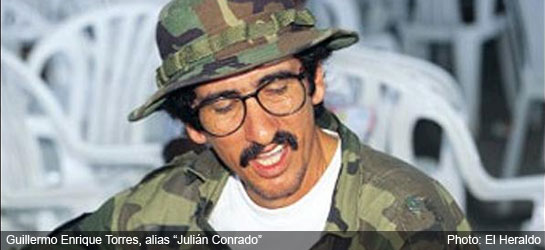
The extradition of FARC commander “Julian Conrado” to Colombia has been put on hold because of a pending asylum request in Venezuela, a leader of that country’s Communist Party said Monday.
Guillermo Torres Cueter, better known by the alias “Julian Conrado,” was captured in southwestern Venezuela in May. He is a senior commander of the Revolutionary Armed Forces of Colombia, or FARC, and Venezuela’s government has said it intends to extradite him to Colombia.
Torres requested asylum in Venezuela last month, and until that request is considered “they can’t extradite him,” Communist Party leader Pedro Eusse told The Associated Press in an interview.
“He wasn’t captured in combat. He didn’t have weapons,” Eusse said. He said Torres “was working as a farmer in Barinas,” the southwestern state where he was captured.
At first Torres was kept isolated after his capture, but that has changed recently as Venezuelan judicial authorities have begun to attend to the case, Eusse said. “He has a right to his defense,” Eusse said.
The Venezuelan Foreign Ministry and Justice Ministry did not respond to requests by the AP for comment on Monday.
Venezuela has 30 days to rule on the asylum request, said Carlos Aquino, another leader of the Communist Party. “Once the process is begun, no type of (transfer) can be carried out” until there is a response to the request, Aquino said.
President Hugo Chavez said in June that Torres’ capture indicated cooperation between Venezuela and neighboring Colombia was producing positive results. Colombian President Juan Manuel Santos praised Torres’ capture, which was carried out by Venezuelan authorities with help from Colombian officials.
Torres is the most senior FARC commander captured since 2004 in Venezuela. The United States had offered a $2.5 million reward for the FARC leader’s capture.
He is wanted by Colombian authorities on charges of homicide, kidnapping and rebellion.
The Venezuelan Communist Party, which is a political ally of Chavez’s socialist party, is optimistic the asylum request will be granted because Torres has said he fears he could be tortured or killed if he is sent back to Colombia, Eusse said.
Justice Minister Tareck El Aissami told reporters last week that Torres “is in the process of extradition to Colombia.” He also said that Torres has a health problem and that “we are investigating.
Eusse described the health issue as a problem with Torres’ prostate and said he thinks the prisoner’s health troubles should weigh in favor of the asylum request.

